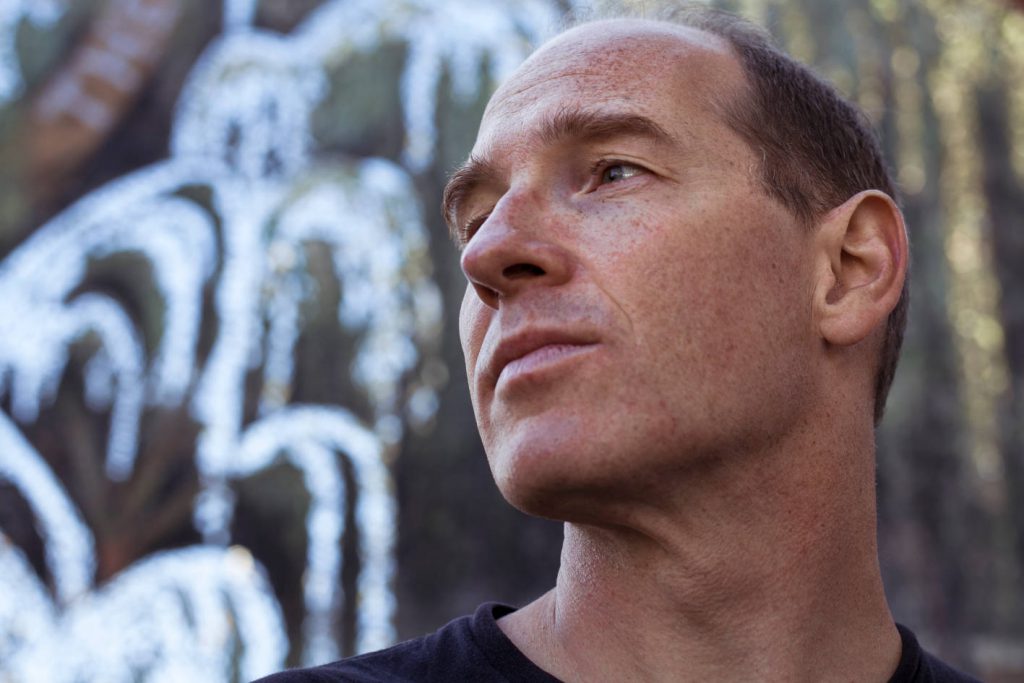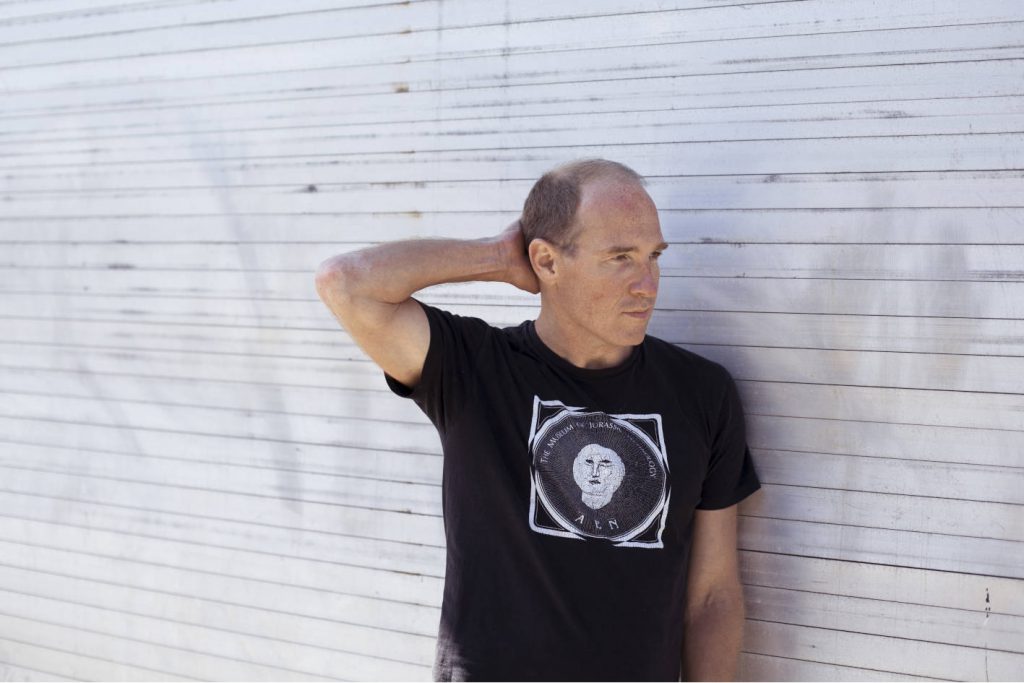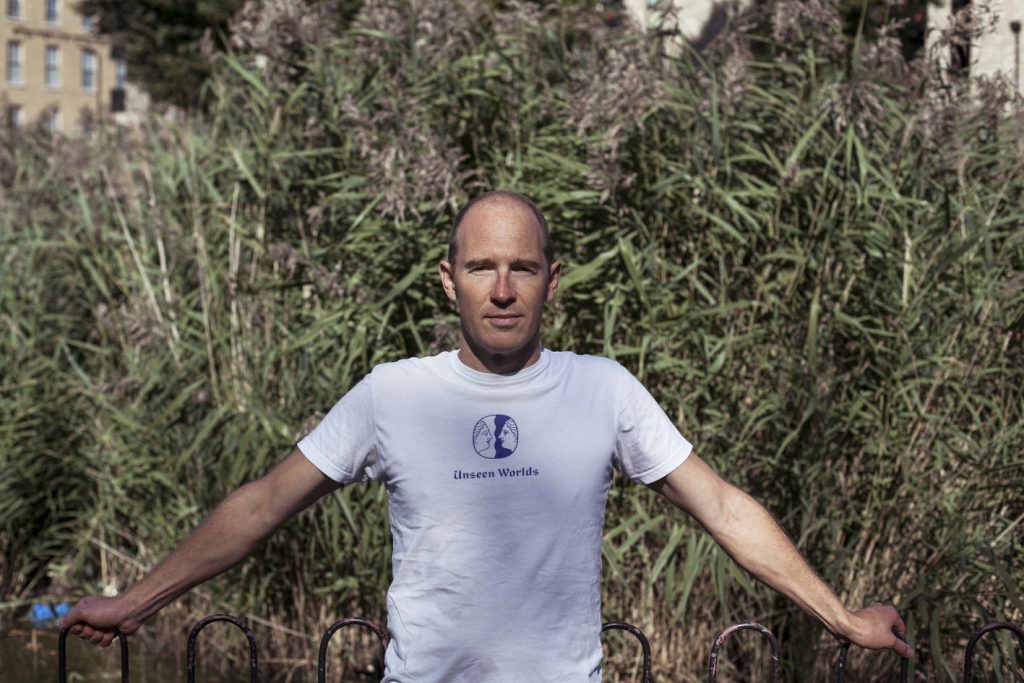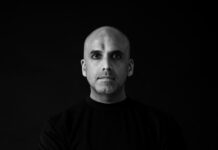Caribou Fotos: Thomas Numm / Press
Hier findet ihr die deutschsprachige Version des Interviews.
Caribou is one of the very few pop stars that has evolved out of the electronic underground without having to cut its ties. By intelligently combining organic sounds with electronic dance beats and catchy hooks, Canadian-born Dan Snaith, who also DJs under his moniker Daphni, has managed to create his unmistakable signature sound. With his breakthrough album Swim (2010), which later made him become Radiohead’s tour support act, both indie kids and pop-savvy ravers alike found each other dancing together on Caribou’s dancefloors – a symptomatic development within London’s scene around 2010 that Snaith hit the nerve with at the time.
Still, in retrospect even Caribou himself thinks that Swim was a lot weirder than the follow-up album Our Love. With its melodic dancefloor anthem “Can’t Do Without You” Caribou owned all of 2014s hands-in-the-air-sunset-moments that festival summer. While talking to Snaith in a backyard office in Berlin-Neukölln, he describes Our Love as an „album for the fans” and „the most streamlined, polished pop music” that he would ever produce.
He kept his word: With his latest album Suddenly Caribou seems to have deliberately decided not to grind his rough edges. Whether rave, euro dance, trap, R’n’B, gospel or house – the eclectic influences of the album, which is based on no less than 900 song sketches, are impossible to pin down. All the more surprising that a coherent piece of art could emerge from this – even Snaith himself agrees. A conversation about sudden changes in his life, the #MeToo movement, XXXtentacion, stagnation in the techno scene – and the healing process of embracing one’s own eccentricities.

It’s been five years since your last Caribou album Our Love came out, followed by your Daphni album Joli Mai in 2017. When did the first ideas for a new Caribou album statt materializing in your head?
Within a year after Our Love was released, I was already starting to generate bits and pieces for this record. It is is different with my Daphni outlet, which is a very particular thing for making functional dance music for my DJ sets or for friends of mine to play. Caribou all encompassing, that’s what I do, I make music for these Caribou records.
So you’re constantly producing music?
Mostly. I don’t make music on tour, I’ve always found that difficult to do. I like to be immersed in my studio environment. So, that’s a break. Being out, playing the music for people to hear, travelling the world, being sociable. After that, I’m ready to go back into the studio. At the moment I am in the opposite extreme. I’ve had that time in the studio and all I want to do now is to get out and enjoy people hearing it and talking to people who have heard the record for the first time.
„I don’t want to be one of those bands where people just want to hear the songs from 20 years ago. I am really allergic to that idea!“
Checking your schedule you indeed seem to have disappeared from the stage, with no Caribou shows in 2018 and just a couple in 2019. Why did you decide not to tour?
I’ve done a few Daphni DJ gigs here and there because they’re fun and I enjoy doing them. With Caribou and the band I was like „We’ve been playing the same set for four years!“ I want to come back with something new to say. I’m not done coming up with new ideas yet. I have this kind of deal with myself where I don’t want to feel like I’m treading the same ground or that the new album is just not as good as the old one. Or that I’ll be one of those bands where people just want to hear the songs from 20 years ago. I am really allergic to that idea! But, simultaneously, look at anybody with a long discography in popular music …
Like the Pet Shop Boys, they just released the 14th album.
Yeah right! And what song do the fans want to hear on their concerts? „West End Girls“ or whatever. You probably don’t want them to play their songs from last year. I’m fighting that endlessly! That’s the main reason why it takes me five years. I think, it’s not good enough. That I need to keep that foot on the accelerator to make something new and interesting each time. At least to my satisfaction. I do feel lucky, I’ve been making music for almost 20 years. And, at least with the last record, people wanted to hear the new stuff. It feels like a progression forwards still after all this time, which is rare.

Let’s talk about the new album Suddenly then: Swim was about heartbreak and failed relationships, whereas Our Love obviously was about love and the euphoria that comes with it. Was there an overall theme for Suddenly as well or do you not see it in those categories?
I do see it that way, yes, but I have a very particular perspective on it. Our Love was about a certain kind of euphoria, both musically for finding new audiences, playing those big crowds and that kind of thing, but also for me personally, having my first child and the whole world seeming new. A very optimistic, naively euphoric period.
Suddenly is super quintessential of my age. My parents are nearing 80, I have young kids and there have been these huge cataclysm in my family, which is why the album is called Suddenly. Events that have shaken the foundation of our whole family, like deaths from heart-attacks, where people just seemed totally healthy and then are gone. Crises in my parents health. Divorce in the family. My second daughter being born in the back of a car on the way to hospital, that was also not part of the plan …
Wow, that must have been „suddenly“ as well!
Yep. All these things. I feel like, whenever I talk about the album, there have been very hard times in this for me and even more so for the people of my family. I found myself in this new role. I am the youngest child, my wife is also the youngest child, everybody had always taken care of us. We’ve always been the little babies, even though I am 41 years old. And all of a sudden – „suddenly“, as it were – things have shifted. We are caring for our parents, we are caring for our older siblings who have gone through difficult situations. When I listen to the album, that’s what I hear.
„We cannot hide form these things, they are part of everybody’s lives. I have just been very fortunate in my life up to this point, where I haven’t had to bear that weight.“
I hear that kind of wanting to make something positive and comforting and reassuring out of these difficult experiences. Both for the people around me, but also for myself. Music is a kind of therapy, a way of examining those things and making something productive out of it. We cannot hide form these things, they are part of everybody’s lives. I have just been very fortunate in my life up to this point, where I haven’t had to bear that weight.
I actually thought one could hear this older, wiser version of yourself speaking, especially in the first song „Sister“, where you seem to give your siblings a piece of advice. Are you addressing your actual sister in this song?
„Sister“ was actually the last song that I made. I had laid out the rest of the album but I had a sense that I needed something to open it, a statement. I used the same synthesizers than on the last song, so that’s some kind of frame, when you think about it conceptually. So I started singing and the word „sister“ came out. I have two sisters and no brothers. I also have two girls, so I have always been surrounded by women in my family.
When I started writing the lyrics I realized what I was writing about another sudden cataclysm in our culture that had happened in the last five years: I was reflecting on the #MeToo-Movement and how it had shook me and my perception of the world we live in, aside from the obvious high profile media cases. Seeing my social media feed full of all the women close to me talking about their own stories of male violence and harassment … Of course I knew that this existed, I knew, that it was part of our society. But I had no idea how pervasive, how every woman that I talked to, all of my friends, had a story to tell along those lines. That shook me.
„Men who are not part of the problem per se need to be part of the solution in changing the culture that’s acceptable.“
On top of that there were two people in the music industry who I’d met. And you think „Yeah, this person is really friendly and warm“ and suggest they have the same kind of politics. And these two people were called out in the music press as repeated sexual predators. It shook my ability to judge the world around me and to trust people. I think, I’m an optimistic, positive person. But particularly in relation to this issue of violence against women, sexual violence, I got some kind of reality check, that I’ve gotta change the way I think about the world. And that’s what the lyrics in „Sister“ are about. Aside from my literal sister or my daughters, the „sister“ as in women broadly and „brothers“ as in men having to accept the responsibility. Men who are not part of the problem per se need to be part of the solution in changing the culture that’s acceptable.
This also brings me to „Home“: The song is based on a gospel sample by Gloria Barnes in which she sings about being home for her man. You twisted the lyrics into: „She does just what she pleases, ‘cause she’s happy on her own, she picks up all the pieces, she’s going home.“ Was this narrative of independent women something you wanted to highlight on the album?
Women escaping toxic relationships is a theme in our culture, but also in my life. There are two different stories on the album. „Home“ is about a friend of mine, who literally went home after leaving somebody, but also figuratively by rediscovering herself and re-establishing her identify outside of this destructive relationship. „New Jade“ is a similar story about a divorce in my family. These are things that have been in my personal sphere, but have also felt relevant on a broader level as well.
„Home“ was the first single you put out. Like „Can’t Do Without You“, the first single for Our Love, it is a very poppy hit single, yet in the context of the album they both seemed to be kind of stand-alone tracks. How does „Home“ fit into the context of Suddenly?
This is a question I am not really sure I know the answer to. I’ve made all this music for the album and felt like: „Wow, it’s all over the place!“ Very diverse. And I was wondering, if it was going to cohere into an album at all. The thing that surprised me, when I put the songs in order at the end and listened to them for the first time the whole way through I felt like „Yeah, it does actually fit!“ In a weird, non-obvious way, they are all pieces of the same jigsaw puzzle. When we had the discussion with the label about the singles, „Home“ was an obvious candidate, because it’s catchy and it’s two minutes long. But it doesn’t represent the album at all. So, whenever we chose a song, it would be like: „But that leaves all this out!“ It’s an album that is very hard to pin down stylistically. I like that about it but I had a really hard time wrapping my head around it. It fits together, but I don’t know why.
Talking about the musical aspect of the album: How important are samples for your music? I had the feeling that there were very many of them on Suddenly.
Sampling has always been a part of the way I think about music. I grew up listening to hip hop records by A Tribe Called Quest, Wu-Tang-Clan, Madlib or J Dilla. And still today I am interested in people like Kanye. Through sampling I found out about a lot of old music. When I came across this Gloria Barnes sample I thought: „This is just begging to be looped and turned into this kind of hip hop era instrumental!“ Of course it’s appropriating somebody else’s music, so you have to be careful and conscious and it’s problematic in some ways.
But the wonderful thing about sampling as a music maker is, that it will take you to a different path that you would have never gone down on your own. There is a sample at the end of „Lime“, this track that halfway through feels like the floor opens and it drops into a completely different track. And that’s a sample from an old record. I had never thought to do something that crazy and drastic.But then I can build on those things and interpret them. As an impetus to head down a path that you wouldn’t expect, it’s great way to open those windows that wouldn’t have been obvious.
„With Our Love I had pushed the idea of making it kind of concise and pop as far as I was going to go. I didn’t think I could do any more in that direction. So instead, I wanted to embrace exactly the opposite, the weird eccentricities.“
I was indeed particularly thinking about „Lime“ when the sample-question came up for me. The track starts off with a jazzy vibe and then builds up over some vocoder vocals to drop to a folky tune that makes you think of Arthur Russell. Do you like to challenge your listeners?
I like to be challenged with any genre, I love that feeling. For me, Our Love was the most streamline, polished, pop-concised music that I’ll ever make. It was like: „Let’s see if I can do this, let’s see if I can do some kind of take on pop music“ It was very outward looking, like: „This is for all of you people who have been kind and supportive of my music. I will make it as direct and appealing to deliver it to you.“

In a way giving back, giving your fans what they wanted from you?
Exactly. Without feeling like I was compromising. It was well received and we were playing „Can’t Do Without You“ when the sun was going down at music festivals, which was exactly what I was picturing. But there was one time when I went back to listen to some tracks of Swim, thinking: „Wow, these are way weirder than I remembered them being“. That was kind of the breakthrough album for me – and it was weird! I’d made no attempts to make that palatable to anybody. With Our Love I had pushed the idea of making it kind of concise and pop as far as I was going to go. I didn’t think I could do any more in that direction. So instead, I wanted to embrace exactly the opposite, the weird eccentricities.
So is was more like making music for yourself again, instead of thinking about others?
To a certain degree I think so, yes. I mean, I don’t for a second think I don’t care about the listeners anymore or being intentionally obscure. But there is definitely a sense of people obviously liking it when I make the music as much „me“ as possible, with all the eccentricities that are particular to me. It’s not been a thing that has turned people off my music in the past. So I wanted to make that a part of it again.
You mentioned Kanye West and rap music. On Suddenly you use autotune and contemporary rap music, for example on „Sunny’s time“ there is a rap part. How do you feel about the developments in the current rap scene?
During my adult life time, rap has been the predominant pop music of our time. US hip hop and R&B have been mainstream. Also it has been the site of the most musical innovation in pop music, I think. Somehow, at the moment, every big hip hop song has the same 808 kick drum bassline and the same hi-hat pattern. But if you remove those elements and listen to the other things in hip hop production these days, sometimes I think: „This track is weird man!“
Who are you thinking of in particular?
It’s all in the wake of this sound where everything gets a little woozy and weird. I have hesitations about dropping certain names here, but there was this guy XXXtentacion, who was a rejectional human being by all accounts, but he did it. As a producer I listen to the beats and the instrumental, I am not listening to the rappers so much. And there is this track called „Moonlight“ on his album ?. That track is just bananas! I heard this production and was like: „Who made this beat? I’ve gotta find out who made it!” So if you listen to that track and then to „Sunny’s Time“, you’ll see that there is a rhyme there. It has this weird pitch bending … (imitates sound).
Do you feel like there is more innovation in hip hop than in techno and electronic dance music right now?
At the moment: Yes! I mean, I could be wrong, but when Swim came out it felt the other way around. All the exciting records I was hearing, in Berlin but also in London, people like Floating Points putting out his first record, Joy Orbison, Hessle Audio that whole sound. Every week it seemed in London there would be a big new track like: „Holy shit, have you heard this new Joy Orbison track, it’s crazy!“ You’d play it and people would go nuts. It felt like a really fertile time and Swim was feeding off of that energy for sure, being in London at that time. And I haven’t felt that so much recently. I’m friends with a lot of people form that scene and they are making beautiful music. But I’m like: „Somebody make a big f***ing tune, come on!“ (laughs)
We are all playing big clubs now and somebody needs to make a big track to play that just is on the next level. Not that they are not making great music. But, for instance, Sam, Floating Points, who is relentlessly supplying us with huge tunes, he got more interested in a different kind of music and made more abstract stuff like Elaenia. Which is great! But it felt like he was doing it partly because this energy had dropped dead in the scene a little. To me – anyway. So that’s why I am turning my attention more to hip hop and R&B and the interesting ideas there. But I completely expect that six months from now this statement will seem ridiculous.
„I grew up in the middle of nowhere in Canada. Anything I could get my hands on was of interest to me. Because there was no culture, no scene that I was interested in. I would listen to a techno record next to a a Yes album, next to Nirvana.“
Do you still feel connected to the club scene?
You know, a lot of my friends in London grew up in the wake of Dubstep and they are very connected to this scene and to preserving its integrity and authenticity. I know that obviously this is very important in Berlin too, those discussions around gentrification. Which is great, it’s wonderful for people to be guardians of this culture and protecting those spaces. But that’s not me. I’m the guy who is looking in every genre trying to find an interesting production idea. I think that’s because I grew up in the exact opposite of a scene. I grew up in the middle of nowhere in Canada. Anything I could get my hands on was of interest to me. Because there was no culture, no scene that I was interested in. I would listen to a techno record next to a a Yes album, next to Nirvana.
What is it like living in London for you at the moment then? Because it feels like all the artists are draining out of the city due to different reasons and with them the innovative spirit and fresh ideas.
The UK is a depressing place politically at the moment. Everybody has this feeling of being disconnected from Europe, which especially for the electronic music world is a very important connection. That’s demoralising and depressing. Also London is gentrifying, it’s harder and harder to have something interesting happening and put on events. There are a lot of things that fight against that.
Do you still have your spaces where you go out in London?
Yes, little clubs, there is one called Five Miles near me or The Cause. They are constantly battling being shut down but managing to make it work somehow.
One last question on Suddenly: I read that for Our Love you’ve produced 700 individual tracks that you condensed into an album afterwards. How many tracks did you have this time?
It’s getting worse and worse. I literally had 900 tracks. That’s when I rely on Keiran – Four Tet – and my wife to help me. I lose perspective really easily and they are both invaluable in helping me. Every couple of months Keiran will be like: „Where are you at with the album? I’m coming over to listen to stuff!“ I’ll play him a bunch of stuff that is half finished, the seed of an idea. And he’d be like: „No, don’t keep working on this one, this one is more exciting!“ Or he’ll hear commonality between ideas, saying „These are of the same kind, but this is the better one.“ I have my own opinions, obviously, but it’s good to have somebody with an outside perspective. I would be lost without him and my wife.





